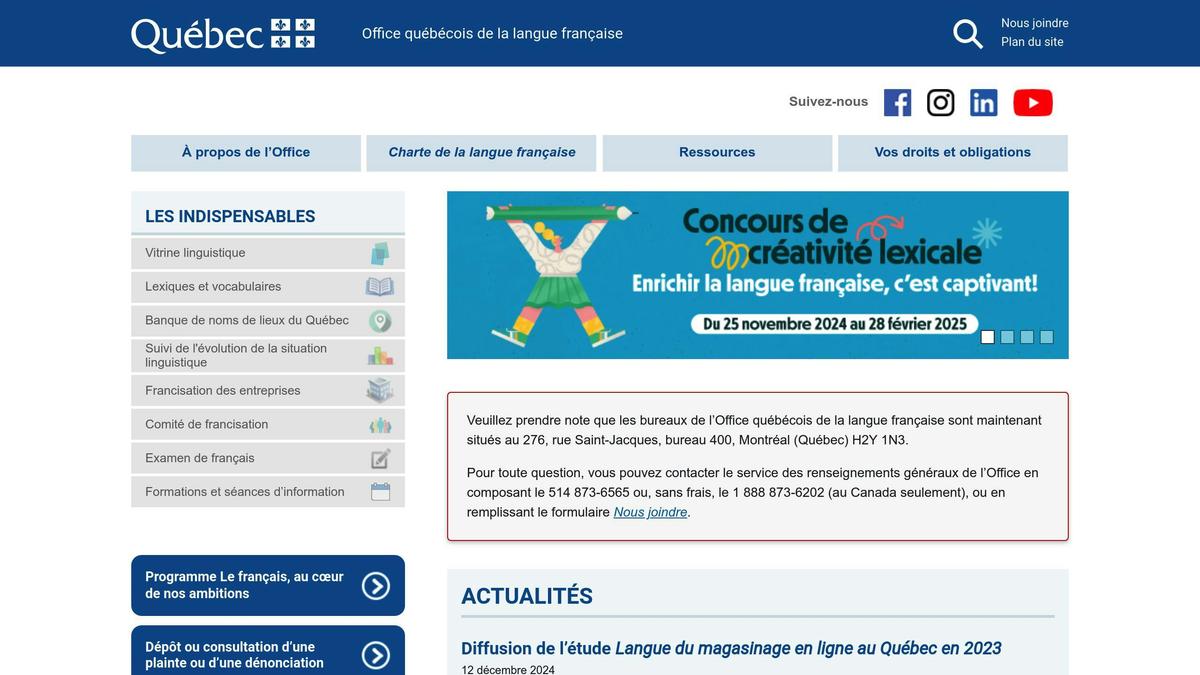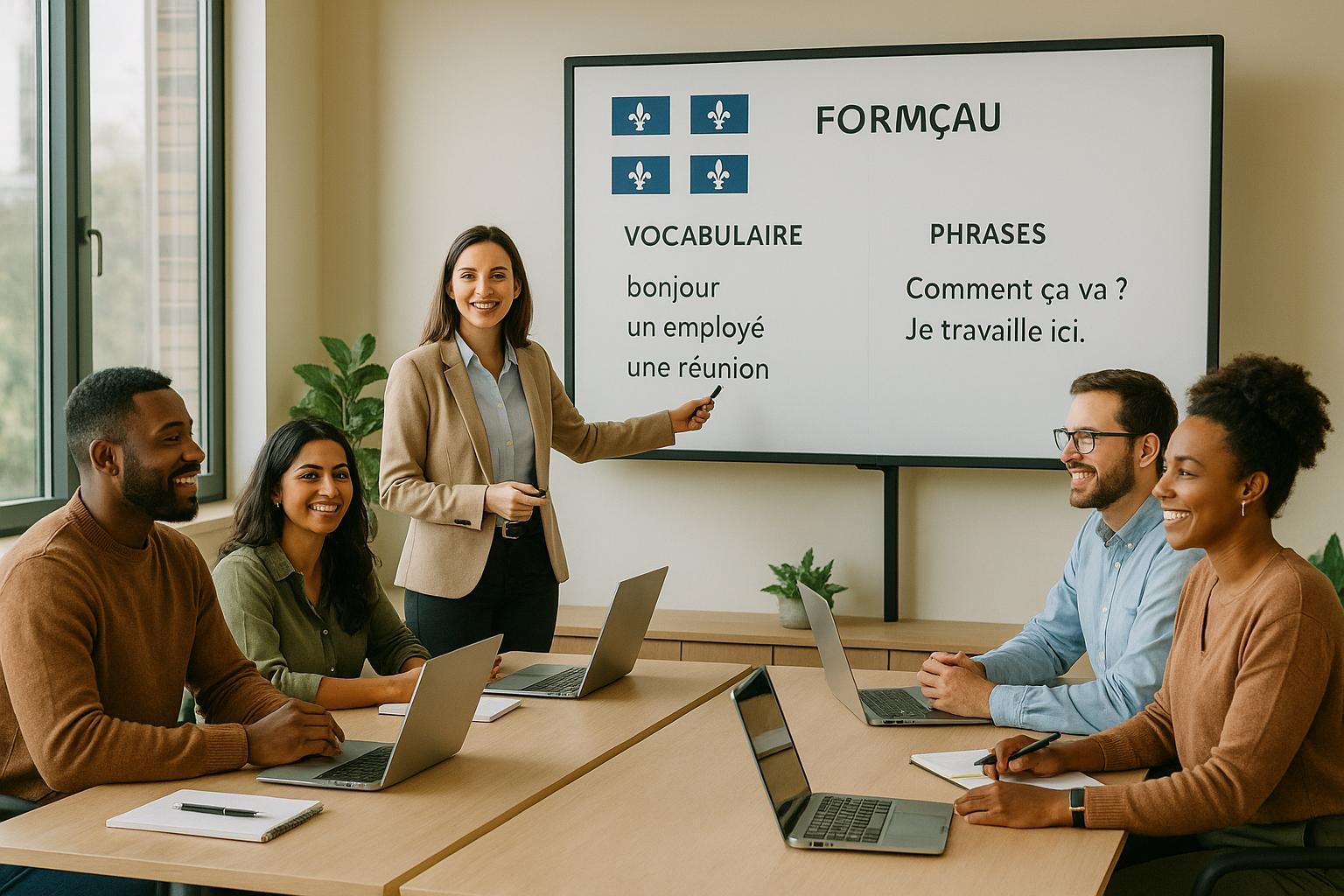OQLF Audits: Preparing Language Proficiency Evidence
Learn how to prepare for OQLF audits by documenting language proficiency, utilizing AI tools, and implementing tailored training programs.

If your Quebec business has 25+ employees, OQLF audits ensure compliance with French language laws. To avoid fines and maintain public contract eligibility, you’ll need to prove employees’ French proficiency. Here’s how:
- Accepted Evidence: OQLF exam, Quebec diplomas, transcripts, or proof of 3 years of French studies.
- Documentation: Maintain organized employee records, role-specific language requirements, and training progress.
- Training: Use AI tools like Francoflex for personalized, scalable French language training and automated audit preparation.
- Regular Assessments: Evaluate and document written, oral, and workplace language skills quarterly.
Staying compliant requires strong records, frequent evaluations, and effective training programs. AI tools simplify the process and help businesses meet OQLF standards.
Steps for Preparing Language Proficiency Evidence
Accepted Language Proficiency Tests
The OQLF accepts several official methods for proving French language skills. Here are the main options:
| Evidence Type | Description |
|---|---|
| OQLF Exam | An official standardized test with no expiration date. |
| Quebec Secondary School Diploma | Issued by the Ministère de l'Éducation, also valid indefinitely. |
| Secondary Level Transcripts | Includes fourth or fifth year French as a first language exam, permanently valid. |
| Post-Secondary Education | Completion of three years of full-time studies in French, valid permanently. |
Temporary permits can be issued for up to three years. However, permit holders must take the OQLF exam each year to maintain their status [1]. After passing any of these tests, the next step is to ensure proper documentation is in place for audits.
Proper Documentation of Language Proficiency
Organized documentation is key for OQLF audits and helps avoid penalties. Focus on these three areas:
-
Employee Records Management: Maintain individual files for each employee, including their language certifications, diplomas, and test results. Keep these updated and well-organized for audit purposes [3].
-
Position-Specific Requirements: Clearly outline the language requirements for every role in your organization. This ensures compliance with Quebec law and supports workforce planning [2].
-
Training Progress Documentation: Track employee development through initial assessments, progress milestones, certificates of completion, and regular evaluations.
Regularly review and update your documentation to reflect any changes in OQLF regulations. Staying ahead helps your business avoid penalties and ensures eligibility for public contracts and government funding [2][4].
French Exam for Professional Orders in Québec - OQLF Guide

Using AI-Powered Language Learning Tools
AI-driven platforms are changing the way businesses handle documentation and language training. They simplify processes, improve employee language skills, and help companies get ready for OQLF audits, all while maintaining strong French language training programs.
How AI Helps in Language Training
AI-based tools are reshaping traditional training methods, offering businesses three major benefits when it comes to OQLF compliance:
| Benefit | Description | Business Impact |
|---|---|---|
| Personalization | Adjusts to each employee's skill level and role | Prepares employees efficiently for OQLF exams |
| Flexibility | Provides 24/7 access to training materials | Fits into work schedules without disruptions |
| Scalability | Works for small teams or large organizations | Expands training without raising per-user costs |
This approach ensures employees make steady progress while keeping up with OQLF audit standards.
Francoflex: A Practical Tool for OQLF Compliance

Francoflex is a great example of how AI tools can support businesses in meeting OQLF requirements. It provides tailored solutions to boost workplace French proficiency and includes features such as:
- Daily AI Conversations: Employees practice job-specific French through daily interactions.
- Progress Tracking: Custom reports track employee improvements for OQLF audits.
- Workplace Integration: Training materials focus on industry-specific language and scenarios.
Francoflex also automates reporting and tracking, cutting down on administrative tasks while ensuring all necessary documentation is in place for OQLF audits. Its structured approach helps businesses document employee language progress effectively, a critical part of compliance.
When paired with regular assessments and scalable training options, tools like Francoflex become essential for building a strong compliance strategy.
Strategies for Maintaining Compliance
Meeting OQLF compliance requires a clear plan for assessing language skills and providing effective training. Below are practical strategies businesses can use to stay on track.
Regular Language Assessments
Conducting regular assessments helps identify language skill gaps and ensures employees meet compliance standards. These evaluations should be tailored to the specific needs of each role for better results.
| Assessment Component | Frequency | Purpose |
|---|---|---|
| Written Evaluations | Quarterly | Evaluate grammar and professional writing |
| Oral Assessments | Semi-annually | Check verbal communication skills |
| Workplace Observations | Monthly | Monitor language use in daily tasks |
| Progress Reports | Quarterly | Document improvements for audits |
Keeping detailed records of these evaluations is crucial for OQLF audits. Employees in customer-facing roles may require more frequent assessments compared to those in back-office positions. Once weaknesses are identified, targeted training programs can address these effectively across the organization.
Scalable Training Programs
Training programs should be designed to grow with your business while maintaining high standards. Using data from assessments, these programs can focus on specific employee needs to ensure continuous improvement and compliance.
Key features of effective training programs include:
- Customized training tailored to individual roles and assessment results
- Progress tracking through regular evaluations
- Flexible delivery options for group or one-on-one learning sessions
Structured training programs help employees meet OQLF standards without disrupting daily operations. Regular tracking ensures job-specific language requirements are met, keeping the organization compliant.
AI-driven solutions like Francoflex can simplify this process by automating progress tracking and customizing training content for each employee. By combining these strategies, businesses can stay prepared for audits and align with OQLF requirements [1].
Wrapping Up
AI-powered platforms like Francoflex make it easier for businesses in Quebec to meet compliance standards by automating documentation and offering customized training solutions. With tools that integrate seamlessly into workflows, companies can simplify compliance efforts while promoting a French-speaking work environment.
Keeping thorough records and conducting regular assessments is crucial for meeting OQLF audit requirements. AI tools play a key role here, offering features like automated tracking and tailored learning paths to ensure businesses stay on track.
Francoflex helps businesses navigate OQLF compliance by providing personalized training, automated progress tracking, and language tools designed for specific industries. These features work together to ensure businesses maintain proper documentation while improving language skills across their teams.
Here are some critical components for effective compliance:
- Strong Documentation: Keeping detailed records of language assessments and training progress
- Smart Technology Use: Utilizing AI tools to support consistent skill-building
- Ongoing Evaluation: Regularly assessing language proficiency levels within the organization
Achieving and maintaining compliance isn’t a one-time effort - it’s a continuous process. By pairing scalable training programs with AI solutions like Francoflex, businesses can stay prepared for future OQLF audits while building a workplace that thrives in French. This approach supports both immediate compliance and long-term language development goals.
FAQs
Navigating OQLF requirements can be challenging for businesses. Below are answers to some common questions to help clarify the process.
How long is the OQLF exam?
The OQLF exam takes about 3.5 hours and evaluates professional French language skills. To pass, candidates need a minimum score of 60% in each skill area. The exam is free, and understanding its structure can help businesses prepare their employees for success, especially during audits [1].
Preparation courses are available to guide candidates through all four components of the exam.
What is the francization process in Québec?
The francization process involves three main steps:
- Registration with the OQLF
- Submitting required documentation
- Receiving certification after meeting the criteria
This process is mandatory for businesses with 25 or more employees. Certification ensures French is used across the organization and that employees meet language standards. By following these steps, businesses can comply with regulations and avoid potential penalties during OQLF audits.
AI-driven tools can simplify this process by automating tracking and providing customized training aligned with OQLF standards, making it easier to meet requirements while supporting language development.






